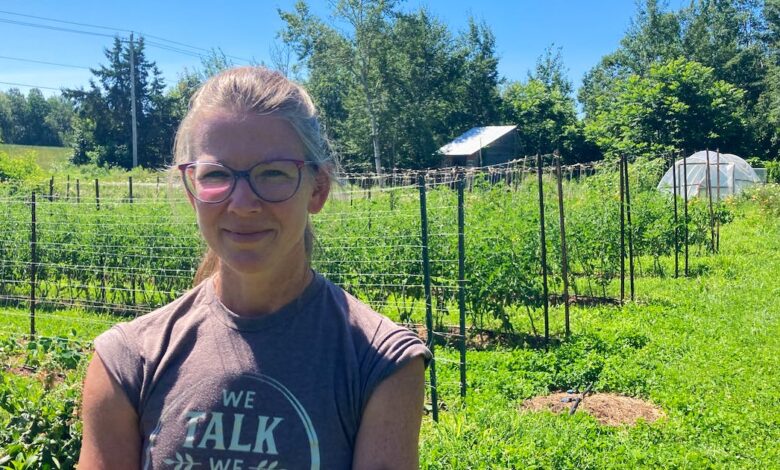Weather-battered Nova Scotia farms need people buying local more than ever

A deep freeze in February. Drought and fires in May. Non-stop rain in June. Flooding in some areas in July.
It has been another rough year for many Nova Scotia farmers, including those operating small-scale operations that depend on local sales through roadside stands and farmers markets for their livelihood.
“If folks weren’t buying from local farms, including small-scale farms, then these farms wouldn’t exist,” says Jocelyn Durston of Seven Acres Farm and Ferments in Canning.
“It’s important on that personal level of income and being able to pursue work that we’re excited about and passionate about and make that work. But in the bigger picture it’s really important because if we don’t have folks buying from local farms, and have local farms we’re living in a very tenuous environment in that we don’t have food security around us.”
And even beyond that, she said, while we can import food right now, the impacts of climate change on major food-growing countries and the cost of transportation are a cause for concern and make having local farms and farm products even more important.
“We need consistent customers because crops grow consistently.”
– James Twaddell of What on Earth Farms
Small farms don’t produce at the scale to be able to sell through large retailers, so all revenue comes from local fresh sales and sales of value-added products through local small and independent stores.
“We’re totally reliant on that,” Durston said.
The losses some farms have dealt with this year make getting as much of their product sold even more important, she said.
“The weather this year has made it extremely challenging for farmers to grow fruit, grapes for wine, vegetables, food for their livestock, all those things. The crops that farmers are having success with and are able to harvest with good quality to be able to sell, you really want people to buy those because you don’t have other crops that you would normally have.”
The farm has had some issues with seeds not germinating or seedlings not surviving, or having poor growing weather and shorter harvest times. Two of its big spring crops are shelling peas and broad beans, which are normally harvested for about month, but this year saw only five or six days of harvest time because it became so hot.
Sour cherry losses
James Twaddell of What on Earth Farms in Sheffield Mills has about three and a half acres in production. He moved his operation from Blomidon in the spring, and said having people buy local will help offset small famers’ losses.
He lost his sour cherry crop to the February cold snap, and the May drought meant poor germination of some crops.
In the past week he sold out of product for sale, and said he appreciates the support from local customers.
He thinks that’s a sign that people are becoming more aware of the struggles of local farms and the importance of supporting them.
“This spring was a little quiet, but the last week or two I’ve really noticed a difference in people reaching out and buying these and coming through the farmers’ market.
He said he hope that continues and isn’t just an anomaly.
“We need consistent customers because crops grow consistently. We have crops throughout the year that we need to sell.
Last week, Farmers’ Markets of Nova Scotia released a message to the public asking them to buy local now, because of the challenges that have overwhelmed farmers this year.
Why buying local is still important in 2023 (before it’s too late): How our changing climate poses increased challenges for producers, why the farmers’ market community is a balm for corporate greed and inflation, and what we can *actually* do.https://t.co/SJVPw4htp6 pic.twitter.com/rIr8cfEkrO
— Farmers’ Markets of Nova Scotia (@MarketFreshNS) July 27, 2023
Lindsay Clowes with the Wolfville Farmers’ Market said the situation facing farmers who set up at the weekly market is the worst this year it has ever been including many lost crops.
The market has also started an information campaign asking people to buy local.
“It’s not just one thing this year, it’s been one thing after another that’s impacting the farmers at all levels,” she said. “They’re all feeling the impact that climate change is having on our province.”
She said the impacts started with the polar vortex that ruined grapes, cherries and peaches for many growers
“Then there was the drought, the fires, too much rain, the floods… it started in the winter, which you don’t usually think of as impacting the growing season.”
She said she can see evidence of the pressures on the farmers who use the market and sees posts from farmers about how they are struggling.
“It’s a difficult year, but I think the farmers feel the support of the community,” she said.
Since the provincial group’s post, there appears to have been an increase in the number of customers at the market, Clowes said. There has also been a jump in the number of people ordering through the market’s online sales site.
“We just did deliveries today and packed all the orders, and it was one of our busiest days in a while,” she said.
“We’re saying support local now, but… it shouldn’t just be a case of ‘support us now because we’re struggling,’ there has to be a shift in shopping habits going forward.”




